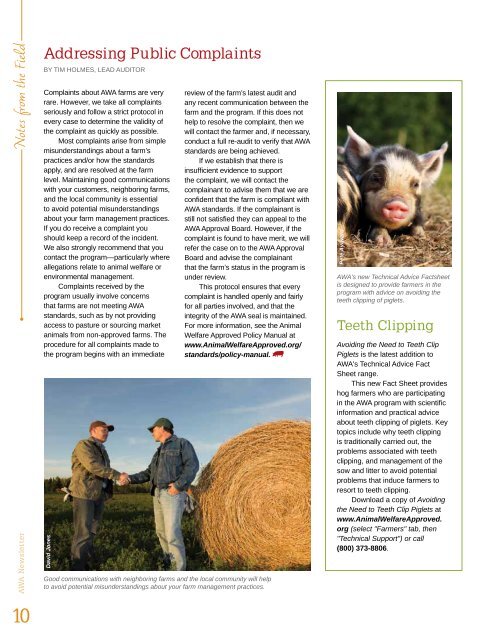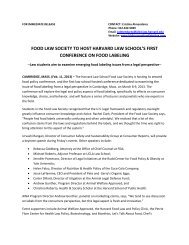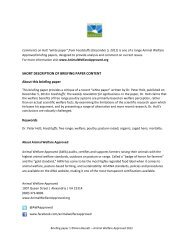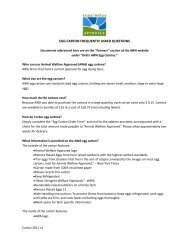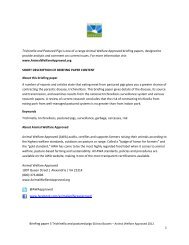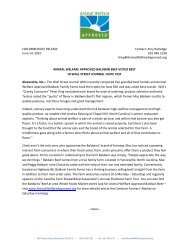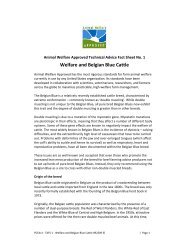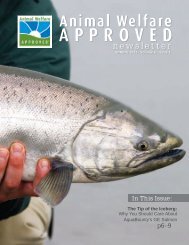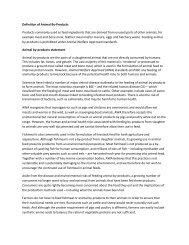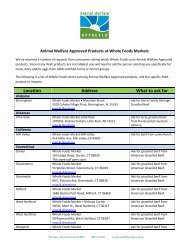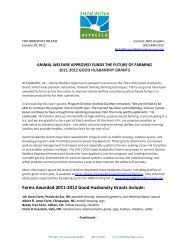Summer 2012 Animal Welfare Approved Newsletter
Summer 2012 Animal Welfare Approved Newsletter
Summer 2012 Animal Welfare Approved Newsletter
You also want an ePaper? Increase the reach of your titles
YUMPU automatically turns print PDFs into web optimized ePapers that Google loves.
AWA <strong>Newsletter</strong> Notes from the Field<br />
10<br />
Addressing Public Complaints<br />
By Tim Holmes, Lead Auditor<br />
Complaints about AWA farms are very<br />
rare. However, we take all complaints<br />
seriously and follow a strict protocol in<br />
every case to determine the validity of<br />
the complaint as quickly as possible.<br />
Most complaints arise from simple<br />
misunderstandings about a farm’s<br />
practices and/or how the standards<br />
apply, and are resolved at the farm<br />
level. Maintaining good communications<br />
with your customers, neighboring farms,<br />
and the local community is essential<br />
to avoid potential misunderstandings<br />
about your farm management practices.<br />
If you do receive a complaint you<br />
should keep a record of the incident.<br />
We also strongly recommend that you<br />
contact the program—particularly where<br />
allegations relate to animal welfare or<br />
environmental management.<br />
Complaints received by the<br />
program usually involve concerns<br />
that farms are not meeting AWA<br />
standards, such as by not providing<br />
access to pasture or sourcing market<br />
animals from non-approved farms. The<br />
procedure for all complaints made to<br />
the program begins with an immediate<br />
David Jones<br />
review of the farm’s latest audit and<br />
any recent communication between the<br />
farm and the program. If this does not<br />
help to resolve the complaint, then we<br />
will contact the farmer and, if necessary,<br />
conduct a full re-audit to verify that AWA<br />
standards are being achieved.<br />
If we establish that there is<br />
insufficient evidence to support<br />
the complaint, we will contact the<br />
complainant to advise them that we are<br />
confident that the farm is compliant with<br />
AWA standards. If the complainant is<br />
still not satisfied they can appeal to the<br />
AWA Approval Board. However, if the<br />
complaint is found to have merit, we will<br />
refer the case on to the AWA Approval<br />
Board and advise the complainant<br />
that the farm’s status in the program is<br />
under review.<br />
This protocol ensures that every<br />
complaint is handled openly and fairly<br />
for all parties involved, and that the<br />
integrity of the AWA seal is maintained.<br />
For more information, see the <strong>Animal</strong><br />
<strong>Welfare</strong> <strong>Approved</strong> Policy Manual at<br />
www.<strong>Animal</strong><strong>Welfare</strong><strong>Approved</strong>.org/<br />
standards/policy-manual.<br />
Good communications with neighboring farms and the local community will help<br />
to avoid potential misunderstandings about your farm management practices.<br />
Pete Aylward<br />
AWA's new Technical Advice Factsheet<br />
is designed to provide farmers in the<br />
program with advice on avoiding the<br />
teeth clipping of piglets.<br />
Teeth Clipping<br />
Avoiding the Need to Teeth Clip<br />
Piglets is the latest addition to<br />
AWA's Technical Advice Fact<br />
Sheet range.<br />
This new Fact Sheet provides<br />
hog farmers who are participating<br />
in the AWA program with scientific<br />
information and practical advice<br />
about teeth clipping of piglets. Key<br />
topics include why teeth clipping<br />
is traditionally carried out, the<br />
problems associated with teeth<br />
clipping, and management of the<br />
sow and litter to avoid potential<br />
problems that induce farmers to<br />
resort to teeth clipping.<br />
Download a copy of Avoiding<br />
the Need to Teeth Clip Piglets at<br />
www.<strong>Animal</strong><strong>Welfare</strong><strong>Approved</strong>.<br />
org (select "Farmers" tab, then<br />
"Technical Support") or call<br />
(800) 373-8806.


